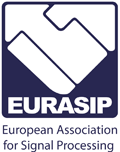
 |
| |

Greece Section
Region 8 |
| |
|
TUTORIALS
-
“Comparison and simulation of different anticollision methods for RFID-communication”
Prof. Dr. Helmut Woellik, Carinthia University of Applied Sciences, AUSTRIA
Abstract
Anticollision methods are necessary during the presense of numerous transponders in the reading area. Basically, there are two main methods (stochastic and deterministic procedures) to identify each transponder out of a bulk. The presented simulation shows the advantages and disadvantages of every method and will help to identify meaningful values of the necessary time consumption and reliability.
-
“Research Challenges in 3D Search Engines”
Dr. Petros Daras, Informatics and Telematics Institute, HELLAS
Abstract
Determining the similarity between 3D objects is a challenging task in content-based recognition, retrieval, clustering and classification. Its main applications have traditionally been in computer vision, mechanical engineering, education, e-commerce, entertainment and molecular biology. Such applications are expected to expand into a variety of other fields in the near future. The aim of this talk is to present the research challenges in this scientific field and to propose solutions towards the development of the first 3D search engine able to perform efficient retrieval of 3D content taking into account text, sketches, 3D images and 3D objects in a distributed P2P environment.
Short CV
Petros Daras is a Senior Researcher at the Informatics and Telematics Institute. He received the Diploma degree in Electrical and Computer Engineering, the MSc degree in Medical Informatics and the Ph.D. degree in Electrical and Computer Engineering from the Aristotle University of Thessaloniki, Greece, in 1999, 2002 and 2005 respectively. His main research interests include Computer Vision, multimedia search and retrieval, the MPEG-4 standard, bioinformatics and medical informatics. He has been involved in more than 20 European and National research projects. Dr. Daras is a member of IEEE and the Technical Chamber of Greece.
-
“Sensor Networks Foundations”
Dr. P. Spirakis, HELLAS
Abstract
The author will present some foundational aspects of Sensor Networks. He will discuss and survey the dominant interaction models and also some basic problems in sensor nets (and their solutions) that are key to the operation of such networks. Finally he will discuss open issues and the future evolution of the area.
Short CV
Paul Spirakis born in 1955, obtained his PhD from Harvard University, USA, in 1982. Has served as a postdoctoral researcher at Harvard University and as an assistant professor at New York University, (the Courant Institute). He was appointed as a Full Professor in the Department of Computer Science and Engineering of Patras University (Greece) in 1990.
Paul Spirakis was honored several times with international prizes and grants (e.g. NSF), also the top prize of the Greek Mathematics Society. Acknowledged between the top 50 scientists worldwide in Computer Science with respect to "The best Nurturers in Computer Science Research", published by B. Kumar and Y.N. Srikant, ACM Data Mining, 05.
He was appointed as a Distinguished Visiting Scientist of Max Planck Informatik.
Paul Spirakis is the Director of the Research Academic Computer Technology Institute (RA.CTI).
His research interests include Algorithms and Complexity and interaction of Complexity and Game Theory.
Paul Spirakis has extensively published in most of the important Computer Science Journals and most of the significant refereed conferences. He has edited various conference proceedings and is currently an Editor of Several Prestigious Journals.
Paul Spirakis had published two books through Cambridge University Press, and eight books in Greek.
Paul Spirakis was the Greek National Representative in the Information Society Research Programme (1ST) from January 1999 till June 2002. He was elected unanimously as one of the two vice-Presidents of the Council of the European Association for Theoretical Computer Science (EATCS). He has been a member of ISTAG (Information Society Technologies Advisory Group) a prestigious body of about 40 individuals advising EU for research policy, from January 2003 to January 2005.
He consults for the Greek State, the European Union and several major Greek Computing Industries.
-
“Nucleotide Genomic Signals”
Prof. Paul Dan Cristea, Bio-Medical Eng. Center, University “Politehnica” of Bucharest, Romania
Abstract
The nucleotide genomic signals methodology is based on the conversion of symbolic nucleotide sequences into digital genomic signals. The methodology can be used both for the analysis of large scale features of genomic sequences, maintained over distances of 106 - 108 base pairs, allowing to reveal hidden features and ancestral structures of nucleotide sequences, but also for the local study of nucleotide sequences, such as in the analysis of pathogen variability, important in the context of the development of pathogen resistance to treatment.
Short CV
Paul Cristea graduated the Faculty of Electronics and Telecommunications of the University "Politehnica" of Bucharest (UPB) in 1962 as head of the series, the Faculty of Physics of the University of Bucharest in 1969 and obtained his Ph.D. in Technical Physics from UPB in 1970. Since then his research and teaching activities covered an extended area of Electrical Engineering and related domains. He is the author or co-author of more than 125 published papers, 11 patents, and contributed to more than 20 books in these fields. Prof. Paul Cristea has been elected Correspondent member of the Romanian Academy (March 10th, 2006), and currently serves as general director of the Bio-Medical Engineering Center of PUB and director of the Romanian Bioinformatics Society.
|